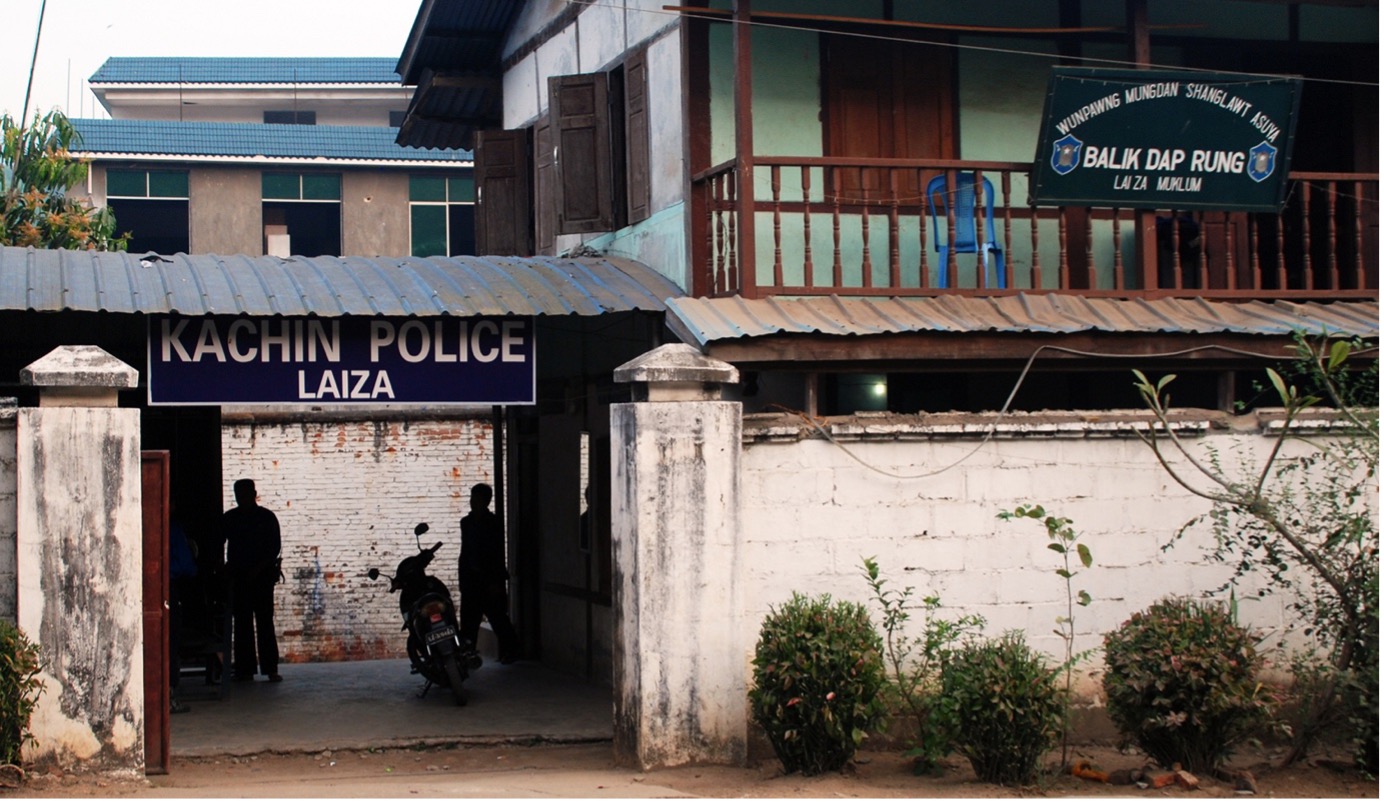
Contemporary Burma Studies is deeply committed to contextual research. Nonetheless, the field increasingly employs established concepts from the wider social sciences in order to make sense of Myanmar’s complex social and political fabric. This begs a few important questions: How useful are social scientific concepts for explaining social processes in a country as unique as Myanmar? What are their limitations? And how can Myanmar speak back to the social sciences in ways that critically engage with – and further develop – social scientific concepts themselves?
Take the notion of rebel governance, which has become incredibly popular in Conflict Studies, a subfield of Political Science and International Relations. Rebel governance research appreciates that rebels are inherently political actors whose actions comprise much more than fighting on the battlefield. It also highlights the multidimensional political orders that rebels produce. Specifically, rebel governance scholars seek to explain contexts in which rebel groups – and not the state – rule over territory and provide public goods and services to populations under their control.
Unsurprisingly, the notion of rebel governance has entered the vocabulary of Burma Studies too. After all, Myanmar’s fragmented state has never exerted uncontested authority over its territory, large pockets of which have long been controlled by ethnic armed organisations (EAOs). Many EAOs have built states within the Myanmar state that provide crucial public goods and services to populations in Myanmar’s border areas, including education, health, and security. Developing governance capacities is arguably a fundamental building block of revolutionary practice in Myanmar. This holds true for established EAOs that control large swathes of territory, such as the Kachin Independence Organisation (KIO), the Karen National Union (KNU), or the United Wa State Army (UWSA), who have set themselves up in the Maoist tradition of revolutionary guerrilla warfare.
It also applies to newcomers in Myanmar’s revolutionary landscape. Take for instance the incredible efforts that the Arakan Army (AA) has committed to building up governance systems since it wrestled off territory from the Burma Army. Or consider how some of the even younger post-coup People’s Defence Forces (PDFs) in Magway, Sagaing or Kayah State have instituted rudimentary governance mechanisms in their liberated territories despite the ongoing onslaught of Myanmar’s generals. Consequentially, Burma Studies has been attuned to rebel governance, long before the term became fashionable.
In fact, the long history and sophisticated nature of EAO governance in Myanmar can generate unique insights not only with regards to the common-place question of why and how rebels govern. They can also shed light on the more important question of what socio-political orders emerge from situations of rebel governance? In other words, Myanmar is illustrative for understanding the effects of rebel governance on how society and politics is organised, or even more fundamentally, how rebel governance co-produces society and politics itself.
Therefore, I believe that Burma Studies is uniquely placed to critically evaluate the merits and shortcomings of commonplace articulations of rebel governance in ways that can help to develop the concept. See, for instance, Karin Dean’s work on governance and assemblage in the Myanmar’s northern borderlands, Andrew Ong and Hans Steinmüller’s article on governance as care in the Wa State, Alicia De La Cour Venning’s research on Kachin rebel governance and international law, Kevin Woods’ scholarship on Chinese investments and armed sovereignties, or my own previous work on recognition in the Kachin and Karen rebellions.
In light of this, I argue that Burma Studies should move past applying the notion of rebel governance, i.e., making use of a social scientific concept invented elsewhere to explain observable reality in Myanmar. As I will show below, rebel governance as a general social science concept, is indeed limited in understanding observable revolutionary practices in Myanmar. Instead, I believe that the empirical insights and interdisciplinary approaches of Burma Studies enable the field to rethink the notion of rebel governance beyond the methodological confines of Political Science and International Relations, and to make wider, conceptual contributions to Conflict Studies.
This seems particularly relevant as Myanmar has hitherto largely been ignored by the disciplinary study of armed conflict and organised violence, which has mostly developed against the empirical backdrop of select conflicts in Southeast Europe, Africa, and the Middle East. Let me start to illustrate this point with my recent co-authored research on the Pat Jasan anti-narcotics movement in Kachin State, which shows how Myanmar necessitates the sociological (re)development of rebel governance.
In a recent article, Martina Tazzioli and I explore rebel governance in the context of the ‘Kachin War on Drugs’. By this we mean the campaign of a diverse set of Kachin actors seeking to address the narcotics emergency in Kachin State and northern Shan State, most importantly the Pat Jasan. The movement with the Jinghpaw language name, which translates as ‘to stop and clean up’ or ‘to band and clear’, emerged in 2014. Its most visible incarnation is young members in camouflage who arrest drug users, run rehabilitation camps, and burn down poppy fields. While the Pat Jasan is sometimes described as an independent vigilante movement, we conceive of it as part of the wider Kachin revolutionary figuration, as Dan Seng Lawn and his co-authors have also done. This is because the anti-narcotics movement has developed in close interaction with the two main pillars of Kachin revolutionary nationalism: The Kachin Independence Organisation (KIO) and the Kachin Baptist Convention (KBC).
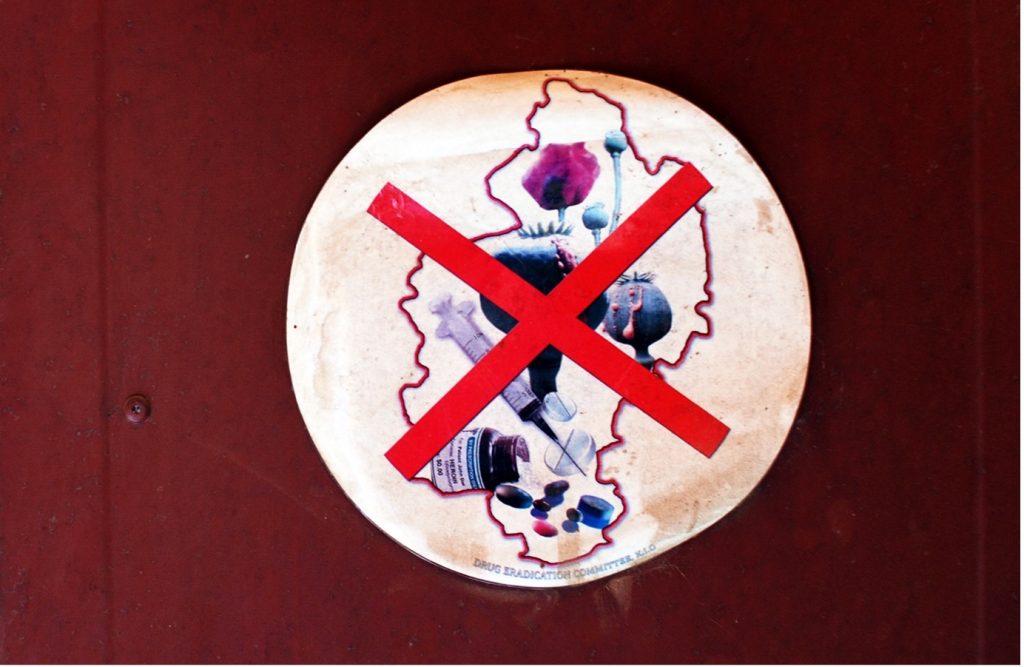
The Pat Jasan is more than a regulatory exercise that responds to a public health emergency in absence of meaningful state interventions. As such, the Pat Jasan cannot be understood solely with conceptualisations of rebel governance that are common in Conflict Studies, which reduce rebel governance to the realm of transactionalism and instrumentalism. In other words, conflict scholars mostly explain rebel provision of public goods with the rebellion’s need for popular support, and thus, legitimacy. Yet, the Pat Jasan and its allies in the KIO and KBC have not only, or even primarily, sought to eradicate drugs to garner support from local populations.
Rather, Tazzioli and I suggest that the Kachin rebellion fights against drugs – and establishes rebel governance more widely – because it is precisely through these interventions that the Kachin nation comes into sovereign existence despite the absence of formal statehood. This does not mean that rebel governance is the only mechanism that produces Kachin nationalism. As I discussed elsewhere, cultural artefacts and social practices, such as karaoke music, can be another important site for producing revolutionary Kachin nationalism. In her recent book Repossessing Shanland, Jane Ferguson shows how such processes do not even need to be tied to (physical) state territory, as is the case with Shan nationalism.
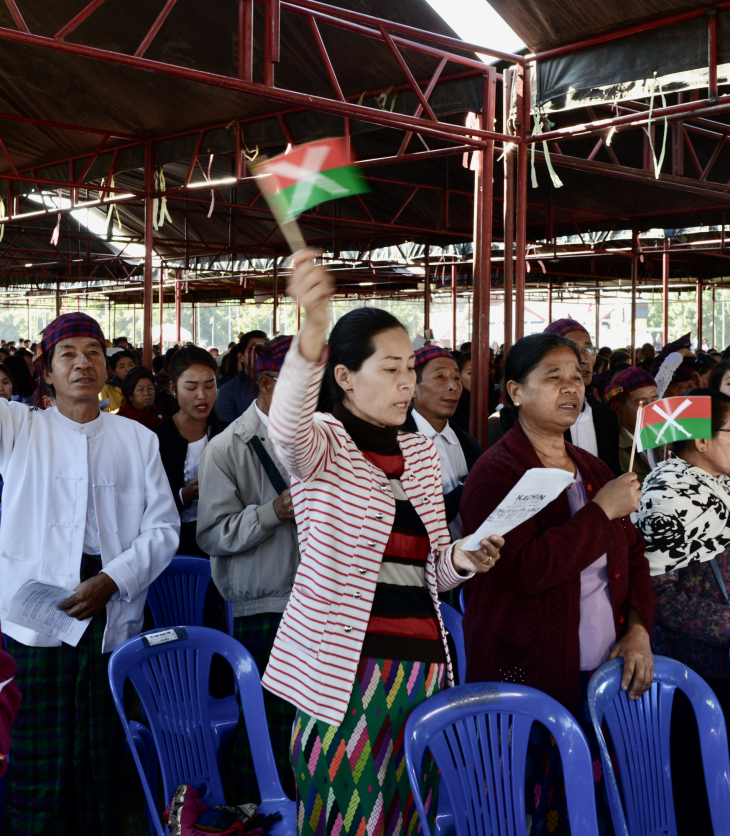
10 Minutes To Read
April 16, 2020
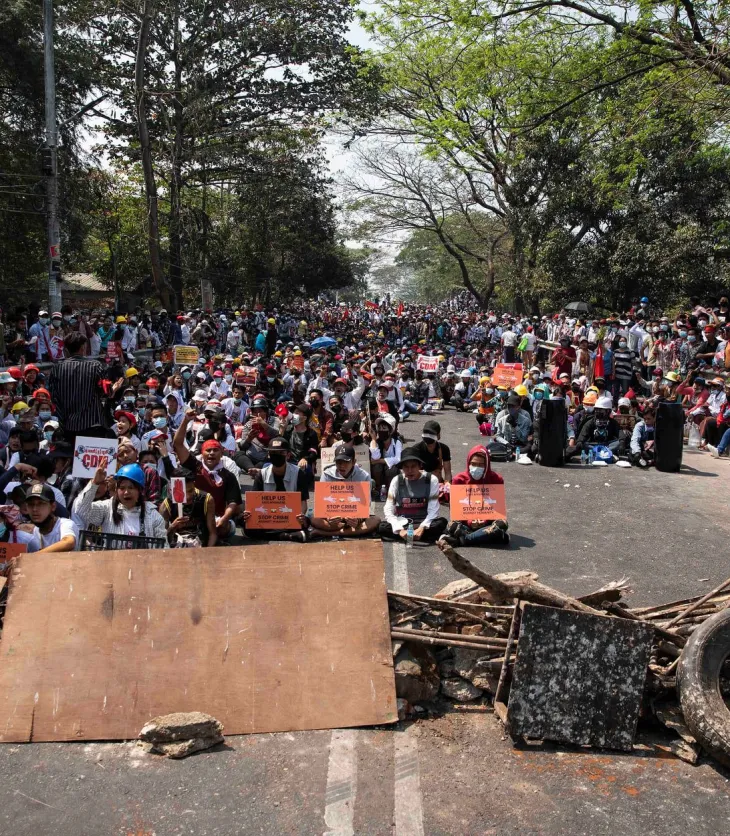
10 Minutes To Read
March 22, 2021
Rebel governance seems particularly potent in producing non-state nations. To understand this process, however, the concept requires further sociological development. Tazzioli and I do this by mobilising Michel Foucault’s work on biopolitics. Biopolitics, or biopower, is part of Foucault’s theocratisation of power in the modern nation-state, as elaborated in his lecture Society Must Be Defended. In contrast to Weberian power, that mainly relies on disciplining people through violence and coercion, biopower is about moulding populations through institutions and authorities. These institutions and authorities normalize people’s conduct in a variety of social fields, including in school or hospital, but also the general bureaucratic apparatus of the state. Biopolitics is thus about enhancing life in relation to people’s physical and mental health as well as the general welfare of populations.
We put biopolitics in close conversation with Partha Chatterjee’s scholarship on postcolonial governmentality and nation-building in South Asia. In Chatterjee’s analysis of India’s anti-colonial liberation movement, he argues that national sovereignty was less about the external sphere of sovereignty; that is, about material institutions and de-jure recognition. Instead, for Chatterjee, true national sovereignty was founded primarily on an internal sphere of sovereignty, in which Indian intellectuals debated social institutions, ethico-religious practices, and moral conducts of the Indian nation that contrasted with the Western colonizers. In his book The Nation and its Fragments, Chatterjee writes in reference to Benedict Anderson’s famous work on nationalism: “in this, its true and essential domain, the nation is already sovereign, even when the state is in the hands of the colonial power.” (Chatterjee 1993, 6).
Our engagement with Chatterjee avoids simply dragging Foucault to Myanmar’s borderlands and replacing the notion of rebel governance with biopolitics. Instead, we critically intervene in the biopolitics literature itself, by thinking through biopolitical dynamics beyond the Westphalian nation-state, and recalibrate the notion to the context of EAOs. In doing so we suggest that rebel governance rests on biopolitical technologies that have a direct effect on forming the non-state nation in competition with the existing nation-state of Myanmar, as well as with other competing ethnonationalist projects, such as Shanni or Lisu politics. In the case of the Pat Jasan, these biopolitical technologies surround moral discourses and ethico-religious practices that define and inscribe what a healthy and virtuous Kachin nation is.
From this perspective, drugs are not only disastrous because they destroy individual bodies; they also pose an existential threat to the Kachin nation because they corrupt Kachin youth, destroying their bodies and minds. For Kachin nationalists, the narcotics crisis is bound up with a wider moral decay of Kachin youth and society. ‘Good’ Kachin do not take drugs. They are virtuous and healthy, which allows them to become soldiers and educated people that can lead the nationalist rebellion into the future. The ‘Kachin War on Drugs’ thus becomes a project in moral restoration, which fits with much longer genealogies of Kachin nation-building campaigns, as argued by Mandy Sadan, Maran Ja Htoi Pan and Dan Seng Lawn.
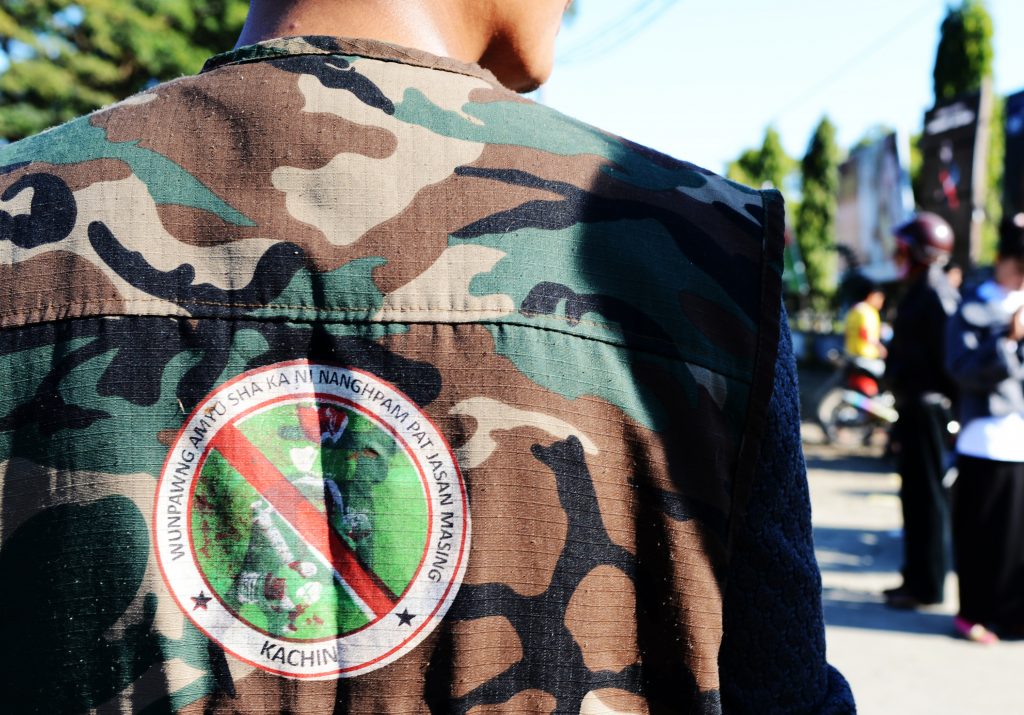
Thinking of rebel governance as competing biopolitics urges closer attention to the ways in which rebel governance in Kachin State is not only about the creation of states within the state but also, and more significantly, about the creation of nations without a state, or national sovereignty in absence of recognised statehood. This issue has thus far been overlooked in rebel governance scholarship, even though it seems relevant for contexts beyond Kachin State, too.
Many contemporary rebel groups claim to represent constituencies that can be conceptualized as non-state nations. This is most obvious in the case of ethnonational movements that seek independence or greater autonomy from existing nation-states, including other EAOs in Myanmar, the Naga movement in Northeast India, the Tamil movement in Sri Lanka, or the Kurdish movement in the Middle East. Parallels can, however, also be drawn to organisations that are commonly viewed as inspired by religion. Many movements that are presently viewed under the prism of global jihad such as the Taliban or Moro Muslim rebels in the Philippines have strong ethnonational underpinnings linked to colonial state-formation processes. Arguably, even movements that mobilize in the left-wing internationalist tradition – as for instance the Zapatistas in Mexico or the Naxalites in India – unfold within the tension between the postcolonial state and indigenous populations.
I hope that our critical engagement with the concept of rebel governance demonstrates how Burma Studies can provide for a much-needed corrective to prevalent paradigms in Conflict Studies, a field that has long ignored the world’s longest ongoing civil war: the one in Myanmar. Myanmar and Southeast Asia more generally have largely been ignored in Conflict Studies, a field of knowledge whose scholars have mostly studied conflicts in Southeast Europe, and select countries of the Middle East and Africa. In another recently published article, Enze Han and I demonstrate this selectivity bias as seen in leading academic journals in the field of Security Studies – the umbrella which Conflict Studies normally falls under.
We suggest that this bias reflects two dynamics. Firstly, as a policy-relevant science that has mainly been practiced in Western universities, Conflict Studies is entangled with Western foreign policy interests due to government funding streams and the oft-found double hats of scholars who also act as policy advisers. Most Southeast Asian armed conflicts simply do not have the same policy relevance in Western capitals as wars in the Balkans or the Middle East. Secondly, Conflict Studies’ ignorance towards Southeast Asia reflects the personal development of scholars and the methodological challenges they face. Scholarly interests are formed through established academic syllabi as well as social contexts and media environments.
I, for instance, grew up with European news media about wars in the Balkans and the Middle East. I also watched Hollywood films about blood diamonds and weapon smuggling in Africa, or American wars in the Middle East. My first university-level course in Conflict Studies focused exclusively on select African countries, such as Sierra Leone, Sudan, or Uganda. These conflicts – or at least their representation – all speak to established paradigms in Conflict Studies, such as the “greed versus grievance” debate, the notion of the resource curse, or the “new wars” thesis. Unsurprisingly, these paradigms emerged from these very empirical backgrounds, many of which are English-speaking environments, with relative ease of physical access, and established fieldwork industries.
As a student in Germany and the UK, I only heard about Myanmar in a conflict studies seminar once. A tutor used the linguistic and religious diversity of the Karen to show the limitations of static definitions of ethnicity that often underlie quantitative studies of ethnic conflict. This encapsulates why Conflict Studies should theorise from Myanmar. Myanmar, and arguably other ignored conflicts in Asia and elsewhere, have the potential to fruitfully disrupt established paradigms in Conflict Studies.
In other words, bridging what David Scott Mathieson has identified as ‘the “Burma Gap” in Conflict Studies’ should not only mean the mobilisation of social scientific concepts and theories in the field of Burma Studies. It also goes beyond cautioning Burma Studies to be careful when deploying social scientific concepts that claim to be universally applicable. Rather, insights from Burma Studies should speak back to knowledge produced in Conflict Studies, whose mainstream theories have mostly emerged from empirical contexts that are far removed from Southeast Asia. Burma Studies scholars’ insights on Myanmar’s decades-long conflict should be used to rethink disciplinary knowledge on violence, conflict, and rebellion.
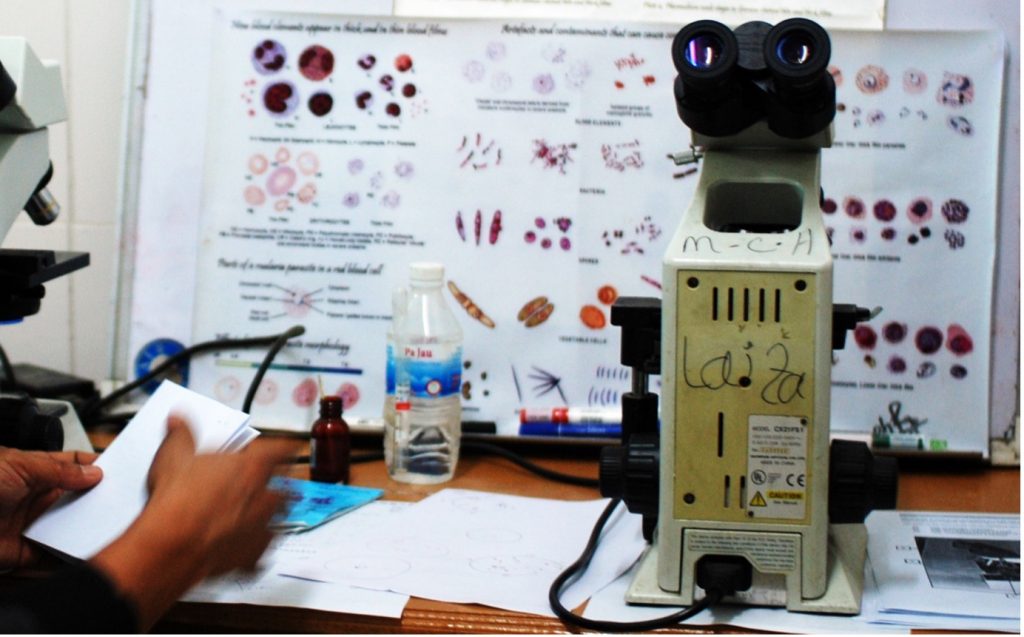
But why is any of this important, especially in a situation where the whole country is burning, and epistemic debates about Burma Studies seem far removed from the immediate needs of revolutionary politics? Undoubtedly, there are more important priorities. Yet, I believe that these questions matter when concepts from mainstream Conflict Studies are uncritically deployed for analysing Myanmar’s multiple conflicts.
The most recent example of how all this can go disastrously wrong was the Institute for Economics and Peace (IEP) debacle. In its 2022 Global Terrorism Tracker (GTI) report, the Australian-based think tank wrongly depicted Myanmar’s anti-junta resistance movements as “terrorists”. In a response to severe criticism from Burma Studies experts, the IEP explained that the GTI, which claims to be “a comprehensive study analysing the impact of terrorism for 163 countries”, only focuses on non-state actors. This does not make sense in relation to any academic definition of terrorism – which recognise the existence of state terrorism. But it reflects deeply flawed assumptions in mainstream Conflict Studies, many of which view armed non-state resistance forces are inherently illegitimate. The “new wars” thesis or the “greed and grievance” paradigm, for instance, have long painted a pejorative picture of rebel movements as predatory formations, whose warlord-style leaders plunder local resources while brainwashed foot soldier murder civilians.
Such caricatures are arguably unfit for the very empirical contexts in which they were originally formulated. They are certainly inappropriate for armed resistance movements in Myanmar. Nevertheless, debates in Conflict and Security Studies have a direct impact on conflict resolution, peacebuilding, and development policies. The IEP prides itself for consulting for the United Nations, the World Bank, or the Australian Department of Foreign Affairs. The entanglement of conflict scholarship and practice indeed leads to a situation where mainstream concepts – however parochial and problematic – have long guided blueprints for intervention. This happened in Myanmar in the decade before the coup, when state-centric Western donor policies downplayed the state’s human rights abuses, ignored grievances of ethnic nationality communities, abandoned border-based non-state projects, and sought to delegitimise non-signatories of the so-called Nationwide Ceasefire Agreement. Back then, some well-meaning donor agendas were co-opted by militarised state bureaucracies; others inadvertently strengthened military authorities by aiding their territorialisation of previously contested spaces.
One way to confront such misconstrued policies and wrongful depictions of conflict in Myanmar is to engage with them directly. A complementary, and maybe more fundamental, way is to use the knowledge produced in Burma Studies to rethink the economistic and state-centric paradigms from mainstream Conflict Studies, which all too often inform assumptions of international stakeholders in Myanmar. Not only do these paradigms have little explanatory power for conflict realities in Myanmar. But they also contribute to the depoliticization and criminalisation of resistance and rebellion. This is something that Burma Studies should challenge by speaking back to the disciplinary field of Conflict Studies itself.
This article is based on two recent journal articles, co-published by the author:
Dr. David Brenner is a Lecturer in the Department of International Relations at the University of Sussex. He is the author of Rebel Politics: A Political Sociology of Armed Struggle in Myanmar’s Borderlands, which was published with Cornell University Press in 2019. You can follow his work and thoughts on Twitter.
Acknowledgements: The author is grateful to Andy Buschmann and Shona Loong for their constructive feedback and engaged editorial process, which helped to greatly improve the original version of this article.
Like This Article
September 16, 2024
March 06, 2024
December 28, 2023

Center for Southeast Asian Studies, Asian Institute 1 Devonshire Place Toronto, Ontario, M5S 3K7, Canada
©TeaCircle All Rights Reserved 2023